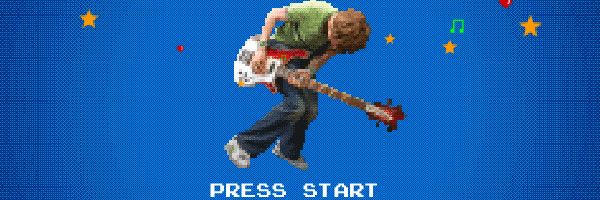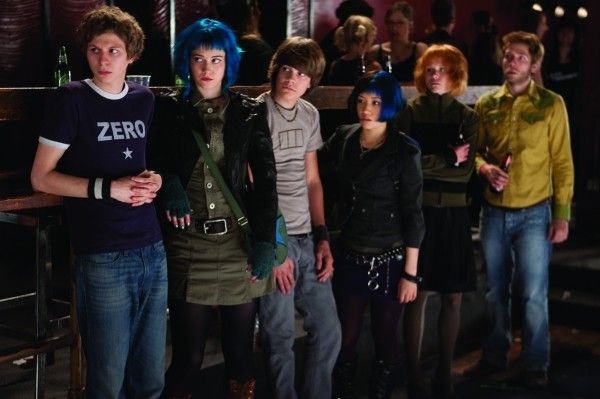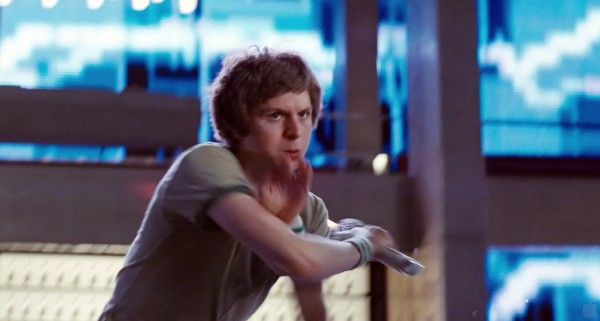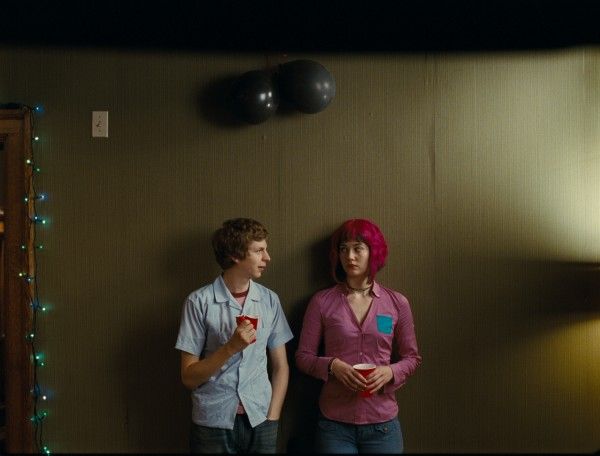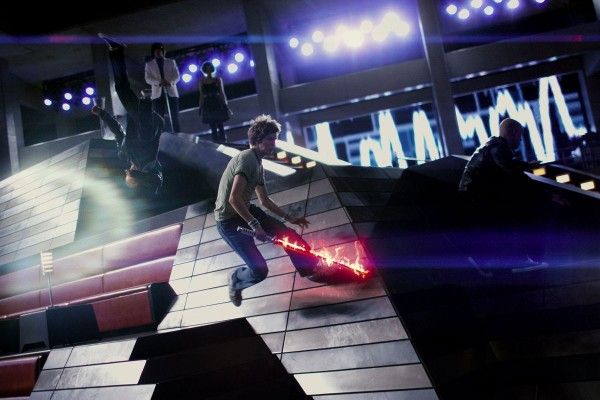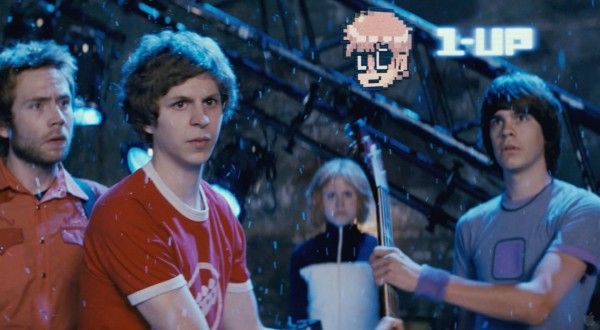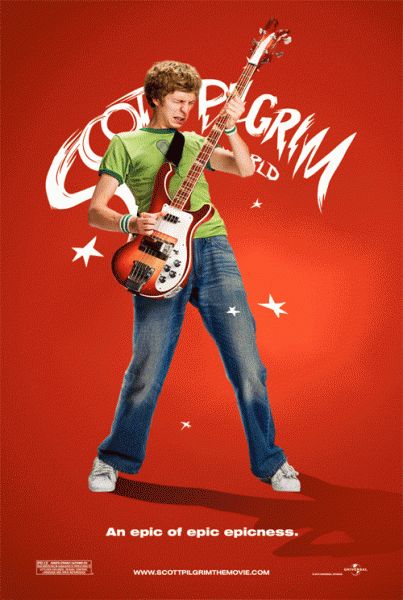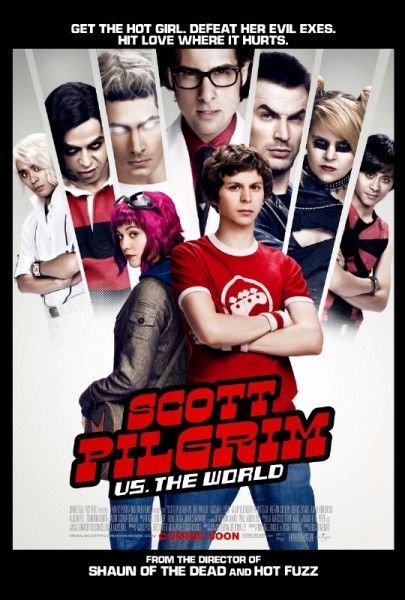How does one reinvent the romantic comedy? The formula for them is simple: Boy meets girl, boy loses girl, happy ending. But finding a new or exciting way to tell that story is always the challenge. And yet Edgar Wright has done it successfully three times now - even if he’s not known as a romantic comedy director (the label used to be for Lubitsch and Wilder, now it’s for Nora Ephron). But in Shaun of the Dead, Shaun must salvage his relationship while the world is on the brink of a zombie apocalypse; in Hot Fuzz he tweaks the action movie genre to show a platonic love story about how sometimes you need a partner to complete yourself; and in Scott Pilgrim Vs. The World it’s about fighting the baggage of old relationships while starting a new one made literal. Michael Cera stars as the titular Pilgrim, who meets Ramona Flowers (Mary Elizabeth Winstead), the girl of his dreams - literally. They start dating, but her evil exes have formed a league to defeat Pilgrim and end their relationship. My review of Scott Pilgrim vs. the World on Blu-ray follows after the jump.
Cera’s Pilgrim is a 22-year-old slacker who lives with and sleeps in the same bed of his gay roommate Wallace Wells (Kieran Culkin), and is the bassist in a band with singer/songwriter/guitarist Stephen Stills (Mark Webber), drummer Kim Pine (Alison Pill), and fill-in bassist /roadie “Young” Neil (Johnny Simmons). Scott’s been dealing with a nasty break-up for over a year and is dating Knives Chau (Ellen Wong) to get out of his dating funk - she’s a seventeen-year-old schoolgirl who’s totally in love with him (his feelings for her are mostly patronizing: he’s being worshipped and likes it). As the perpetually annoyed Julie Powers (Aubrey Plaza) puts it: “dating a high schooler is part of the mourning period.” Ramona enters his mind through a dream (she can actually do that), but he first sees her in the flesh with Knives. He stalks her at a party, acts a jackass, but then finds out where she works and has her deliver him a package.
She agrees to a date and the go out, which ends with him sleeping over. Ramona – as she says– has dabbled with being a bitch, and Scott’s the “nice guy.” But on their second date Scott has to fight her first evil ex-boyfriend Matthew Patel (Satya Bhabha). Side note: I got into a discussion over whether this movie is a musical or not (I thought it was), and when Patel breaks into song in the middle of a fight, that’s the point where it’s fair to say that it is a musical. From there Scott and Ramona’s relationship starts to grow and sag as Scott goes up against the remaining six: Lucas Lee (Chris Evans), a skateboarder-turned-actor ; Todd Ingram (Brandon Routh), a bassist in the band Clash at Demonhead - which is headed up by Scott’s big ex Envy Adams (Brie Larson); Roxy Richter (Mae Whitman), Ramona’s bi-curious college experience; the Katayanagi twins (Keita Saitou and Shota Saito) two wordless mix-masters; and finally Gideon Graves (Jason Schwartzman), a big concert promoter and producer (think Swan from Phantom of the Paradise, or Phil Spector).
The build on Scott Pilgrim is steady, and it takes its time (at least, for an action movie) showing us the characters and their relationships. The first act deals with Scott’s complicated love life as he finds it difficult to hurt Knives, but can’t help pursuing Ramona, and work here by Wright and co-screenwriter Mathew Bacall is constantly inventive. Their cast keep pinging off each other - though Kieran Culkin’s Wallace is a scene stealer (he’s got a great moment just using his finger to circle someone’s ear), it’s hard to say he steals more than Aubrey Plaza (I love her line “wanna-be jerky-jerk) or Brie Larson’s strutting lead singer (for that matter anyone else). The film is like Jim Thompson’s El Ray of supporting performances – it’s filled with killers.
To that, Alison Pill’s Kim Pine is the series’ Boba Fett (there’s a huge fan interest in her, and many wish she had a bigger part to play in the end), but it speaks to the writing and the performance that she’s a fully realized character in such limited screen time. To say nothing of Mark Webber (“a gig is a gig is a gig.”) or the coin-eating Jonny Simmons. But the entire supporting cast is a marvel, and all have their moments to shine – including almost all of the ex-boyfriends (the Katayanagi twins, their relationship with Ramona and how it worked is the only back story kept off screen - much like in the graphic novel). One of the most fun elements of the film is how each new ex brings something new to the table: Chris Evans’s Lucas Lee is a perfect parody of the self-centered action star; Brandon Routh absolutely kills as the blond haired vegan bassist (the film does a great job of making likeable performers likeable assholes); Mae Whitman’s ex is probably the most sympathetic, and Whitman absolutely nails so many great one-liners (“your BF’s about to get F’ed in the B”); Jason Schwartzman’s smarmy Gideon drips show-business phoniness and passive aggression.
And then there are the leads. Michael Cera is the perfect Pilgrim – his comic timing is excellent, and though he comes across as a scrawny geek, he’s is totally believable in his fight scenes (and I love how he stammers a bit on “satisfaction”). There’s been a weird backlash against Cera, and it seems misplaced and stupid – Cera’s a talent. While Mary Elizabeth Winstead is a great compliment to him: there’s a shot of her going to the bed after offering him sleepy time tea where she looks like she could eat him. Winstead has a very complicated role as she’s got to be both sympathetic and a hot mess to deal with, but also show that the issues in their relationship are mutual but not deadly, and she pulls it off beautifully. And Ellen Wong’s Knives Chau blossoms in the film – you get to watch her grow into her own self-confidence.
Thematically, the twins are the least interesting, which should lead to a third act sag, but the energy of their sequence - which has cartoon double dragons fighting an ape – is marvelous and points out that as a musical the sequences of bands playing heighten the film, and are integrated perfectly. There are no dead spots, and on repeat viewings you grow to anticipate each new set piece. The music is aces - from Sex Bob-Omb’s opening track “Threshold” over the opening credits (I knew the film had me when the camera kept pulling back in the title shot), to Clash at Demonhead’s “Black Sheep” (which always makes the hairs on the back of my neck stand up), to Ramona falling for Scott when they do “Garbage Truck,” the music (by Beck, Broken Social Scene and Metric among others) is pitch perfect. Everything sounds authentic and authentically garage, but also manages to rock.
I wonder if comic book creator Bryan Lee O’Malley was influenced by Clerks, because much of Pilgrim’s progress is about coming to terms with Ramona as a sexual being and his insecurity, which is the crux of Kevin Smith’s first (and third) film. But this takes place on a much grander scale, and these questions have plagued relationships time immemorial. To make these problems literal, there’s a magic realism invoked (or Magic: The Gathering realism), and so questioning the reality of the film is missing the point (though in my experience, those who didn’t care for the film focused on two things: Cera and the odious thought of this being a hipster movie, or a movie for and about hipsters, or something to do with that – which makes no sense because it isn’t).
Scott must fight away each ex using kung-fu, his music, his smarts, or the help of his girlfriend in what amounts to spectacular but loopy fight sequences. Each battle mixes comedy, cartoonishness and impressive stunt work and fight choreography. The fight scenes are spectacular –each fight is its own thing, with each having different weapons and styles. As the structure was modeled on video games, each sequence builds to the next and as an action film the movie delivers.
But it’s the relationship stuff that amps the movie from good to great. At first Scott is just happy to be dating, but as his fights go on his insecurities are pressed upon him. He’s already still smarting from Envy (and though Envy plays the bitch, you can see how Scott might have been a problematic boyfriend), but all his opponents play on his insecurities, from feelings of being attractive, being successful, being sexually capable (Roxy taunts Scott that he’ll never make Ramona have an orgasm), being able to control Ramona, or just the negativity within himself.
Of course having control is the biggest issue, as Scott has never been the boss of the relationship, and they aren’t on equal footing for much of the film. But also by fighting for her and (eventually) fighting for himself, he achieves his own masculinity and control of himself. That’s the tricky part - in a lot of ways the film is about the healing process of dealing with bad relationships, but also learning to know yourself enough to be ready for a serious relationship. The film ends on a positive but slightly melancholy note where the possibilities are open, and the film manages to meld its mimicry of video games with the nature of all relationships. Do you have the coins to keep going?
And in that – though the age of the people in it are older – so much of the last couple years of teen movies have so directly emulated John Hughes that they feel like copies of copies, but this is the first film that captures that spirit without ever feeling like a rip-off. Of course, calling this a teen or young adult comedy is as limiting as calling it an action film – like his previous work, Edgar Wright blends genres that it becomes something both familiar and new. He makes movies like the Talking Heads make music – you can see influences, but what emerges is wholly its own. But where the touchstones of Shaun and Hot Fuzz are more obvious – not to take anything away from those films at all –this is never as bound by genre conventions. And it goes without saying that Wright is one of the premiere working directors; the man knows what the hell he’s doing with a camera. Just on a technical level what he does in the visual design of the film is synthesize (what feels like) a million influences, from video games to TV shows to Hong Kong films to blockbusters. Like how Robocop was the best comic book movie not actually based on a comic book, this is easily the best video game movie not actually based on one. But even if you know or don’t know Flash Gordon or Beyond the Valley of the Dolls (which have the most direct nods) it doesn’t matter. The film is told through a pop culture lens (which ties the film back to his Spaced), and though Scott is decidedly low-tech (he plays old consoles and doesn’t have a cell phone), this is about young love in the 21st century, and it’s all filtered through the self-aware, narcissistic and pop-culture savvy lens of modern culture. The film is from the perspective of Pilgrim, and Pilgrim sees himself as the star of his own movie, so everything that is a reference reflects how we now digest pop culture. Wright and company have downplayed how modern the film is, but like Fight Club (which the film pays homage), it’s undeniable he’s advancing the language of cinema and showcasing all of its possibilities.
There’s films that have been sacred texts for those who are fans – films like Fight Club, or Rushmore, or The Killer - films that get passed around and forced on people who may have never heard of them before, and have a deeply passionate following. Scott Pilgrim feels like that, because it taps into something truthful while showcasing what filmmaking can be. And then there are films like the John Hughes movies, or Say Anything, or – in Quentin Tarantino’s case – Rio Bravo; films that are considered relationship deal breakers. Scott Pilgrim has the possibility to be both. I’ve seen the film a number of times now (most recently at an Egyptian screening which was partly a promo event for this release), and had it on in the background while writing this, and I look forward to watching it again soon. The replay value of the film is evident.
Universal’s Blu-ray presents the film in widescreen (1.78:1) and in DTS-HD 5.1 surround. The transfer is pitch-perfect, as is the case with most recent films. The Blu-ray version also comes with the film on DVD and offers a digital copy. But where this disc shines are the supplements. Let’s start: There’s four commentaries, the first is with writer/director/producer Edgar Wright, comic book creator Bryan Lee O’Malley, and screenwriter Michael Bacall, the second with Wright and director of photography Bill Pope, the third with Michael Cera, Jason Schwartzman, Mary Elizabeth Winstead, and Brandon Routh, and the fourth with Anna Kendrick, Aubrey Plaza, Kieran Culkin and Mark Webber. The first two are more film and detail specific - with the first offering a fascinating discussion of the alternate ending - while the actor tracks are much looser, with Aubrey Plaza noting that the commentary was recorded the night after the film’s premiere, and that she is still a little drunk. The film also comes with a storyboard PIP and a trivia track. So, if you watched them separately, there’s seven passes of the film, for your entertainment. The film runs 113 minutes, so that’s 791 minutes right there.
This is followed by twenty one deleted scenes (27 min.) with optional commentary by Bacall and Wright. This is followed by bloopers (10 min.), and a making of (50 min.) that covers the shooting, and suggests that this was a great set to be on – the doc ends with an Edgar Wright love-fest (that sounds genuine). There’s a great featurette on the music (16 min.) that talks to Kevin Drew and Metric about their work on the film, and “You Too Can Be Sex Bob-Omb” (3 min.), which shows the chord progression of one of the songs. This is followed by “Alternative Edits” (12 min.), and “Bits and Pieces” (7 min.) that offers different line readings and takes.
Then there’s a section for Pre-production, with ten pieces (15 min.) on the storyboards, fight choreography tests, footage of the pre-record of the bass battle, and more. Then there’s seventeen animatic sequences (36 min.), and eight rehearsal videos (9 min.). This is followed by “Prop, Rigs and Sets Montage” (3 min.), “Casting Tapes” (14 min.), and “Hair and Makeup Footage” (11 min.). Currently that puts us at 1031 minutes of content - or a little over seventeen hours.
In the “Music Promos” section, there’s four music videos (10 min.), and seven Osymyso audio visual remixes (10 min.), while in “Visual Effects” there’s a before and after comparison (15 min.) with Frasier Churchill commentary, the Roxy fight in its original ribbon version (1 min.), and a “Phantom Montage” (4 min.) which shows the slow motion done for the film with the phantom digital camera without finished effects. As it’s scored to Beck’s “Ramona,” it’s one of the most mesmerizing extras I’ve ever seen (you could put it on a loop). There’s a “Sound for Film Profile” (6 min.) on the mixers and recorders, three trailers, eighteen TV spots, and four video game trailers (19 min.).
The Adult Swim Animated prequel “Scott Pilgrim vs. Animation” (4 min.) is also included, and it’s followed by the goofy “TV Safe version” clips (4 min.) which substitutes the word owl for ass, and pooch and peach for bitch (among other changes). Rounding out the video portion of the disc, there was a series of video blogs made during of the shooting, and all twelve episodes are included (46 min.). Then there’s ten photo galleries: production photos (9 min.), Edgar Wright’s Photo a Day Blog (53 min.), Johnny Simmons Photos (2 min.), Ellen Wong’s Photos (1 min.), Mark Webber’s Photos (2 min.), Theatrical Posters (2 min.), Fictional Posters (3 min.), Bryan (Lee O’Malley’s) Flip Charts (1 min.), Storyboards (63 min.), a conceptual art gallery (11 min.), a graphic novel comparison gallery (26 min.), and storyboards for the deleted ending “Mecha-Gideon” (3 min.). This brings our final total to 1325 minutes of content, which is a little over 22 hours of content. This is exhaustive, but – having watched all the extras and listened to all the commentaries, it’s all fascinating material, and there’s no fat, filler, or bullshitty supplements. I love this film - it’s one of the best films of 2010.

